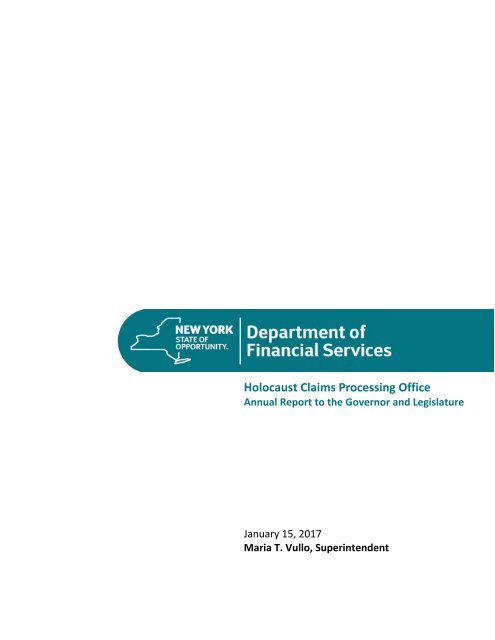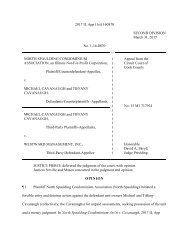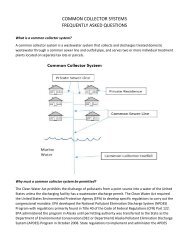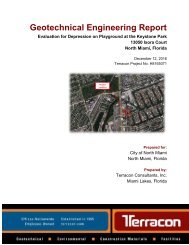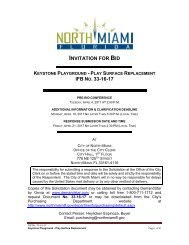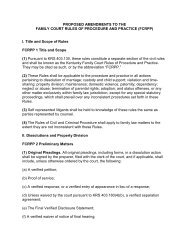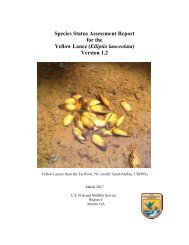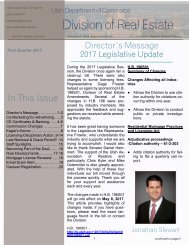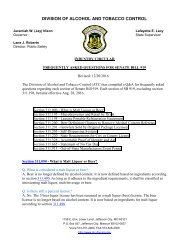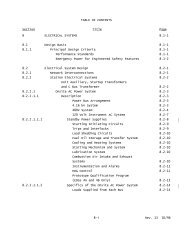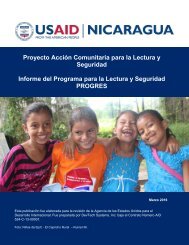Holocaust Claims Processing Office
hcporeport16
hcporeport16
You also want an ePaper? Increase the reach of your titles
YUMPU automatically turns print PDFs into web optimized ePapers that Google loves.
<strong>Holocaust</strong> <strong>Claims</strong> <strong>Processing</strong> <strong>Office</strong><br />
Annual Report to the Governor and Legislature<br />
January 15, 2017<br />
Maria T. Vullo, Superintendent
Table of Contents<br />
I. Introduction 1<br />
II. Overview of Operations and Accomplishments 1<br />
Summary of Operations 2<br />
Demographics 5<br />
Bank <strong>Claims</strong> 7<br />
Insurance <strong>Claims</strong> 8<br />
Art <strong>Claims</strong> 9<br />
<strong>Claims</strong> for Other Losses 10<br />
III. <strong>Holocaust</strong> <strong>Claims</strong> <strong>Processing</strong> <strong>Office</strong> Expenses in 2016 11
I. Introduction<br />
Since 1997 the State of New York has helped individuals of any background obtain a measure of<br />
just resolution for the theft of property during the reign of the Nazi regime. Due to our efforts<br />
banks, insurance companies, international organizations, museums and art collectors, and<br />
countries around the world are sensitized to the issues regarding <strong>Holocaust</strong>‐era assets and<br />
therefore continue to consider restitution claims from <strong>Holocaust</strong> victims and their heirs.<br />
The <strong>Holocaust</strong> <strong>Claims</strong> <strong>Processing</strong> <strong>Office</strong> (“HCPO”) was established to provide institutional<br />
assistance to individuals seeking to recover assets lost due to Nazi persecution. Claimants pay no<br />
fee for the HCPO’s services, nor does the HCPO take a percentage of the value of the assets<br />
recovered. The HCPO is a unit within the Department of Financial Services (“the Department”).<br />
The HCPO has been able to ease the burdens, roadblocks, and costs often incurred when<br />
individuals pursue claims on their own. The HCPO remains the only government entity in the<br />
world that aids <strong>Holocaust</strong> victims and their heirs with a variety of multinational restitution and<br />
compensation processes.<br />
II. Overview of Operations and Accomplishments<br />
The work of the HCPO gained recognition in 2016, with HCPO staffers receiving two significant<br />
awards for their work on behalf of <strong>Holocaust</strong> victims and their heirs. On June 14, 2016, the HCPO<br />
received the Outstanding Citizens Award from the Anne Frank Center for Mutual Respect,<br />
founded by Otto Frank, father of Anne Frank, to help “build a world based on equal rights and<br />
mutual respect.” The honor was presented during the center’s Spirit of Anne Frank Awards, which<br />
honor students, educators and citizens whose humanitarian efforts fight discrimination and<br />
inspire more inclusion.<br />
On October 16, 2016, the HCPO received the Neil D. Levin Award, an honor presented annually<br />
by the Superintendent of Financial Services to a group or individual in recognition of “outstanding<br />
achievement, dedication, and overall excellence in service to the Department or to the people of<br />
New York.” The award is named for the former Superintendent of the Insurance and Banking<br />
Departments in the 1990s, Neil Levin, who died in the September 11 terrorist attacks on the<br />
World Trade Center. Mr. Levin was instrumental in the creation of the HCPO.<br />
The HCPO staff members were selected for these awards for exemplifying the mission of the<br />
organization in their tireless work in seeking the just and orderly return of assets to their original<br />
owners. In fulfilling this mission, the office calls on the expertise of its multi‐talented, multilingual<br />
staffers.<br />
1
Summary of Operations<br />
In response to the complex nature of restitution claims, the HCPO has developed a systematic<br />
method to handle cases. First, individual claims are assigned to members of the HCPO staff who<br />
assist in securing the necessary genealogical and historical documentation to ensure viability of<br />
the claim. As claims received by the office range from the partially or even fully documented to<br />
the purely anecdotal, the HCPO undertakes claimant‐specific research in domestic and<br />
international archives as well as public and private repositories to obtain as much data as possible<br />
regarding lost assets. The HCPO also conducts general historical research to corroborate and<br />
contextualize the information the office shares with claimants, claims processing organizations,<br />
companies, institutions and governmental authorities.<br />
Second, the HCPO determines where to file the claim(s) by ascertaining which present‐day<br />
company or claims process is responsible for the lost asset in question. Third, the HCPO submits<br />
claim information to the appropriate companies, authorities, museums, or organizations<br />
requesting that a complete and thorough search be made for the specified asset and that, when<br />
applicable, the lost property be restituted to claimants. To ensure rigorous review of these<br />
requests, the HCPO maintains frequent contact with entities to which it submits claims. Claimants<br />
contact the HCPO with questions at any time knowing that they have a committed advocate that<br />
will be responsive to their concerns.<br />
Finally, the HCPO reviews the decision rendered on the claim to ensure that it adheres to<br />
published processing guidelines and helps claimants understand these guidelines in order to<br />
interpret decisions. In the event that a claimant wishes to appeal a decision, the HCPO guides<br />
claimants through the appeals process and performs additional research when possible.<br />
Alternatively, when claimants receive positive decisions that include monetary awards, the HCPO<br />
facilitates payment by explaining the various forms and by following up with the claims entity to<br />
confirm payment.<br />
The HCPO continues to work directly with almost all the organizations and processes effectuating<br />
<strong>Holocaust</strong>‐related restitution and compensation. See Figure 1.<br />
2
Figure 1 ‐ Compensation Organizations and the HCPO<br />
3
The HCPO anticipates that victims and heirs will continue to need its assistance, given current<br />
conditions and recent developments, namely: the claims processing entities in the Czech<br />
Republic, France, Germany, Israel, Poland, the Netherlands, and the United Kingdom are still<br />
accepting and handling claims; in accordance with a treaty between France and the United States,<br />
the United States government continues to process claims for wrongs suffered because of<br />
deportation from France during the <strong>Holocaust</strong>; insurance companies continue to review and<br />
process claims submitted directly to them; and the Polish government has passed legislation that<br />
now enables Polish <strong>Holocaust</strong> victims who reside outside of Poland to receive pension payments.<br />
As a result, the time required for submitting and processing claims is determined by<br />
circumstances beyond the HCPO’s control.<br />
In 2016, the HCPO submitted its first case to the German Advisory Commission on the return of<br />
cultural property seized as a result of Nazi persecution, especially Jewish property (“Advisory<br />
Commission”). The HCPO represented the heirs of Felix Hildesheimer, from whom an 18 th Century<br />
violin by Giuseppe Guarneri was thought to have been confiscated by the Nazis or lost as a result<br />
of a forced sale. This was also the HCPO’s, as well as the Advisory Commission’s, first case<br />
involving a musical instrument. The Advisory Commission decided in favor of the HCPO’s<br />
claimants and recommended that the Nuremberg Foundation compensate the Hildesheimer<br />
heirs.<br />
4
Claimant Demographics<br />
In 2016, HCPO received claims from 34 individuals. From its inception through December 31,<br />
2016, the HCPO has received claims from 5,718 individuals from 46 states, the District of<br />
Columbia, and 40 countries. See Figures 2 and 3.<br />
Figure 2 – International Geographic Distribution of HCPO Claimants<br />
(Areas appearing in color represent countries where HCPO claimants reside.)<br />
Figure 3 ‐ Domestic Geographic Distribution of HCPO Claimants<br />
(Areas appearing in color represent states where HCPO claimants reside.)<br />
5
In 2016, HCPO has successfully resolved 2,338 claims of 49 individuals in which an offer was<br />
presented, or the asset deemed non‐compensable. 1 In 2016, claimants received $1,476,618 in<br />
offers.<br />
In total, the HCPO has successfully resolved 14,869 claims of 5,179 individuals in which an offer<br />
was presented, or the asset was deemed non‐compensable. To date, the HCPO has secured 8,363<br />
offers; their combined total 2 for bank, insurance, and other losses amounts to $174,928,396. See<br />
Figure 4.<br />
Figure 4 ‐ Total Offers Extended to HCPO Claimants to Date by Claim Type<br />
$80,000,000<br />
$70,000,000<br />
$60,000,000<br />
$50,000,000<br />
$40,000,000<br />
$30,000,000<br />
$20,000,000<br />
$10,000,000<br />
$0<br />
Bank Insurance Other Losses<br />
1 In addition to assisting in obtaining offers of compensation, the HCPO has assisted thousands of <strong>Holocaust</strong><br />
victims and their heirs obtain resolution of their claims by: demonstrating that the assets sought had been<br />
previously compensated via a postwar restitution or compensation proceeding that was active from the<br />
1950s through the 1970s, or in some cases, through a present-day claims process; showing that the claimed<br />
asset has otherwise been handled appropriately (i.e., in accordance with the original owners' wishes); or<br />
confirming that the asset was not lost as a result of Nazi persecution.<br />
2 Processes offer victims or heirs monetary compensation calculated on the value of the lost assets.<br />
However, the total amount of funds available to a claims agency may be limited and may not allow for full<br />
payment of loss. Thus, the actual payment may be substantially less than the lost asset’s value. The amount<br />
offered is important as it recognizes the actual loss and guides in determining the amount of payment when<br />
full payment is not possible. Therefore, the HCPO reports the amount offered. Sometimes victims do not<br />
consider the offer adequate and do not agree to settle. In other cases, the amount offered is the amount paid.<br />
6
Bank <strong>Claims</strong><br />
In 2016, six individuals submitted claims for assets deposited in banks referencing four individual<br />
account‐holders. In 2016, HCPO claimants received $145,450 in offers.<br />
Of the claims filed with the HCPO to date, 2,513 individuals (from 42 states, the District of<br />
Columbia, and 38 countries) submitted claims for assets deposited in banks referencing 3,875<br />
individual account‐holders. The HCPO has secured the settlement or resolution of 5,988 claims<br />
where the offer was presented, or the asset was deemed non‐compensable. To date, the total<br />
offers extended to HCPO claimants seeking the return of bank assets total $78,848,767. See<br />
Figure 5.<br />
Figure 5 ‐ Bank <strong>Claims</strong><br />
$45,000,000<br />
$40,000,000<br />
$35,000,000<br />
$30,000,000<br />
$25,000,000<br />
$20,000,000<br />
$15,000,000<br />
$10,000,000<br />
$5,000,000<br />
$0<br />
Austrian Belgian French German Israel Swiss United<br />
Kingdom<br />
United<br />
States<br />
2016 Highlight:<br />
The HCPO continues to works with existing international claims processes that offer compensation for<br />
dormant or seized bank assets, including the Commission for the Compensation of Victims of Spoliation<br />
Resulting from the Anti‐Semitic Legislation in Force During the Occupation (CIVS) of the Republic of France.<br />
Through these efforts the HCPO was able to assist the heirs of Charles and Jacques Biederer recover the<br />
proceeds of two French bank accounts lost as a result of Nazi persecution. Charles and Jacques Biederer<br />
were born in Moraska Ostrava, Czechoslovakia and immigrated to France in the early 20 th Century. They<br />
resided in Paris and ran two photography studios well‐known in the 1930s for producing high‐quality<br />
images. Both Charles and Jacques were detained at Pithiviers Camp and from there were deported to<br />
Auschwitz in 1942 where they perished. In 1943, their businesses were liquidated.<br />
7
Insurance <strong>Claims</strong><br />
In 2016, 10 individuals submitted insurance claims referencing 20 individual policyholders. By<br />
year‐end, HCPO claimants received $803,322 in offers.<br />
To date, 2,452 individuals (from 43 states, the District of Columbia, and 27 countries) have<br />
submitted insurance claims referencing 3,718 individual policyholders. The HCPO continues to<br />
receive inquiries and claims for unpaid insurance policies. When possible, the HCPO submits such<br />
claims directly to successor companies for consideration. The HCPO has secured the settlement<br />
or resolution of 6,146 claims where the offer was presented, or the asset was deemed noncompensable.<br />
The total offers extended to HCPO claimants seeking the proceeds of insurance<br />
policies total $34,408,400.See Figure 6.<br />
Figure 6 ‐ Insurance <strong>Claims</strong><br />
$25,000,000<br />
$20,000,000<br />
$15,000,000<br />
$10,000,000<br />
$5,000,000<br />
$0<br />
ICHEIC GSF Direct from<br />
Company (German)<br />
Generali (Non‐<br />
ICHEIC)<br />
Sjoa<br />
2016 Highlight:<br />
Max Hože, born in 1888 in Brno, was the son of Dr. jur. Cornelius Hože and Cecilia Hože née Löw‐Beer.<br />
Cornelius Hože was a lawyer and co‐owner of the cement works in nearby Maloměřice and brought<br />
Max on as co‐owner and partner. In October 1939, not long after the Nazi occupation of<br />
Czechoslovakia, the Gestapo confiscated the Hože family homes. Within three months, the Hože<br />
cement company was put under the control of a Nazi trustee and the assets of the company and<br />
shareholders were confiscated. By 1941 the company was fully Aryanized. A year later, the Hože family<br />
was transported to Theresienstadt, where Max’s mother perished. Max and his wife were sent to Lublin<br />
and Majdanek where they perished. Among his many assets, Max Hože had a valuable life insurance<br />
policy. Working together with attorneys representing the family, the HCPO was able to assist with<br />
securing payment for that policy, valued today at over half a million dollars.<br />
8
Art <strong>Claims</strong><br />
From 1933 to 1945 the Nazi regime carried out the greatest spoliation of works of art in history.<br />
Nazi plundering, which ranged from outright seizure to sales made under duress, was not limited<br />
to museum quality pieces but included works by lesser‐known artists, decorative arts, musical<br />
instruments and composition, and Judaica. Unlike claims for financial assets, claims for<br />
<strong>Holocaust</strong>‐era looted art do not lend themselves to centralized settlements. Instead, given the<br />
individualized nature of these cases, they require working with a variety of entities and must be<br />
resolved on an object‐by‐object basis.<br />
In 2016, the HCPO coordinated settlements for 16 works of art. To date, the HCPO has accepted<br />
170 art claims (from 19 states, the District of Columbia, and 14 countries) referencing thousands<br />
of items in sufficient detail to permit additional research. To date, the HCPO has facilitated<br />
restitution settlements involving 130 cultural objects from 33 different collections. See Figure 7.<br />
Figure 7 ‐ Location of Object at Time of Present‐day Discovery<br />
80<br />
70<br />
60<br />
50<br />
40<br />
30<br />
20<br />
10<br />
0<br />
Museums Private Collectors National Collections<br />
European American Nationality Unknown<br />
2016 Highlight:<br />
The HCPO successfully concluded its first submission to the Advisory Commission, which was also the<br />
office’s first claim for a musical instrument. In late 2013, the Franz Hofmann and Sophie Hagemann<br />
Foundation recognized that the provenance of a violin in its possession, made in 1705 by Giuseppe Guarneri,<br />
had a troublesome gap spanning from 1938 to 1974. The violin’s owner in 1938 was Felix Hildesheimer, a<br />
Jewish purveyor of musical instruments from Speyer, Germany, who committed suicide in 1939 after<br />
suffering years of Nazi persecution. In 2014, the HCPO opened a dialogue with the Foundation on behalf<br />
Hildesheimer’s heirs for the restitution of the violin. Upon reaching an impasse in our discussion with the<br />
Foundation of Hildesheimer’s loss of the instrument as a result of Nazi persecution, the Foundation and the<br />
HCPO agreed to submit the claim to the Advisory Commission. In applying the Washington Conference<br />
Principles, the Advisory Commission concurred with the HCPO’s position and proposed that the Foundation<br />
provide a monetary settlement to the Hildesheimer heirs.<br />
9
Material Losses and Other <strong>Claims</strong><br />
Several compensation agencies administering programs covering bank account and/or insurance<br />
policy losses also assess claims for material and/or other losses resulting from Nazi persecution.<br />
In addition, new programs have recently been established that offer compensation for the<br />
atrocities that individuals suffered as victims of Nazi persecution. Of the HCPO’s claimants, 583<br />
of them (from 36 states and 15 countries) have submitted claims for compensation under<br />
material asset, real property loss or other schemes.<br />
In 2016, 17 individuals submitted material loss claims referencing 32 asset holders. In total, HCPO<br />
claimants received $527,846 in offers in 2016.<br />
To date, the HCPO has secured the settlement or resolution of 2,735 claims where the offer was<br />
presented, or the asset was deemed non‐compensable. The total offers extended to HCPO<br />
claimants seeking other losses total $61,671,202; See Figure 8.<br />
Figure 8 ‐ Other Compensation <strong>Claims</strong><br />
$50,000,000<br />
$45,000,000<br />
$40,000,000<br />
$35,000,000<br />
$30,000,000<br />
$25,000,000<br />
$20,000,000<br />
$15,000,000<br />
$10,000,000<br />
$5,000,000<br />
$0<br />
Austrain Belgian Czech French German Israeli<br />
2016 Highlight:<br />
Over the last two years, the Republic of Poland has enacted several key pieces of legislation<br />
that affect Polish victims of Nazi persecution currently residing outside of Poland. “Victims of<br />
Oppression,” individuals who suffered political, ethnic, and racial persecution during the reign<br />
of the Nazi regime between 1939 and 1945, are now eligible to apply for a monthly pension in<br />
the amount of approximately PLN 403 ($96). The HCPO has assisted a number of claimants<br />
with the process and several have already begun to receive their pension payments.<br />
10
III. Annual Expenditures for Calendar Year 2016<br />
The <strong>Holocaust</strong> <strong>Claims</strong> <strong>Processing</strong> <strong>Office</strong> has a staff of six. The total cost of operating the HCPO<br />
during the 2016 calendar year was $761,890, including personal service, fringe and indirect costs,<br />
and non‐personal service expenditures, as follows:<br />
Total for Calendar Year 2016<br />
Personal Service $480,452<br />
Fringe/Indirect $279,155<br />
Non‐Personal Service $2,283<br />
Total $761,890<br />
NOTES:<br />
Funding: Full costs for the HCPO are borne by the Department of Financial Services.<br />
Fringe/Indirect: Fringe and indirect costs are presented based on the actual payments made. In<br />
SFY 2015–16, the fringe rate was 58.41%.<br />
11


